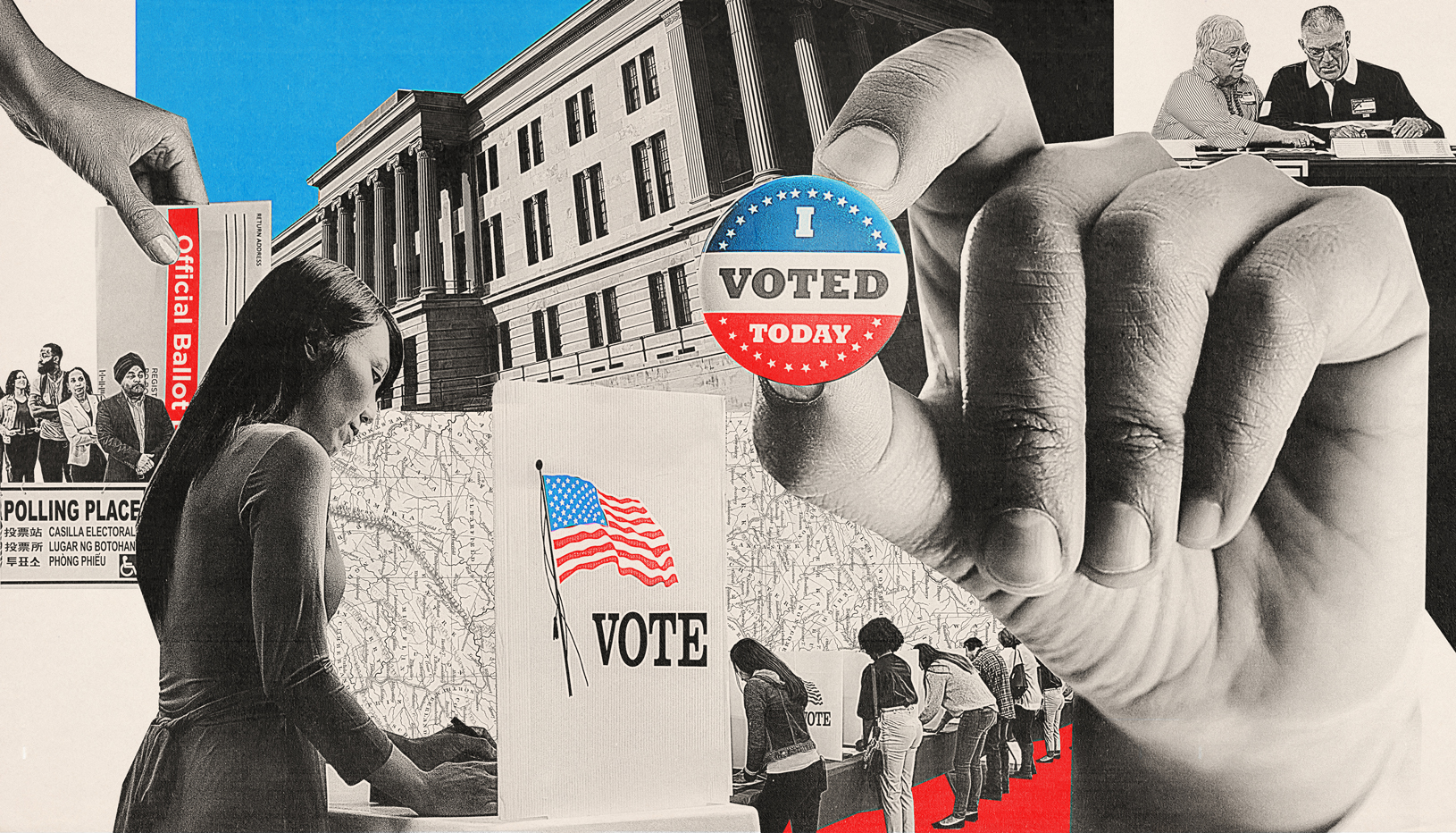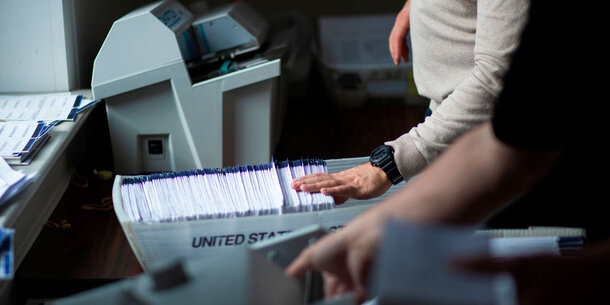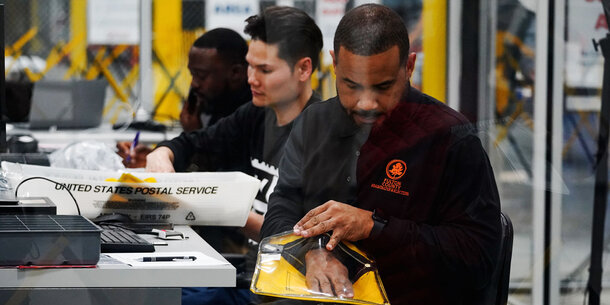When it became clear that former President Donald Trump was likely to lose in 2020, he and his supporters began laying the groundwork to overturn the outcome. They focused on six battleground states: Michigan, Georgia, Arizona, Pennsylvania, Wisconsin, and Nevada. They sowed conspiracy theories about fraud; vilified and threatened honest election officials; encouraged local and state election officials to ignore their legal obligations; sent fake electoral votes to Congress; and even attempted to disrupt the ministerial process by which Congress counted these votes and certified Biden as the winner.
State officials in these states held firm and certified valid results in 2020. But the margins were slim. A member of the Michigan board of canvassers switched sides at the last minute to certify the result — the first non-unanimous vote in Michigan history. Legislators in several states interfered with the process. And the Wisconsin Supreme Court came within one vote of disrupting certification.
Election deniers will repeat some combination of their 2020 tactics, collectively known as election subversion, in 2024. And they will target the same battleground states.
Since 2020, some states have hardened their defenses against election subversion tactics, but others have stood still or even slid backward. A recent Brennan Center report details the best practices for all states in the runup to the next general election. Below is a state-by-state review of whether the states targeted in 2020 are ready for 2024.
Michigan
Of the six “fake elector” states, Michigan has made the most progress in strengthening its election systems.
Voters enacted Proposition 2, which amended the state constitution to expressly foreclose legislative and other political interference in elections. The constitution now makes clear that the duty to certify election results — which some local and state officials toyed with in 2020 — is entirely nondiscretionary.
Michigan’s legislature also gave officials more flexibility to open, verify, and scan mail and absentee ballots before election day, known as preprocessing. The state’s limitations on preprocessing in 2020 predictably led to a “red mirage” in which early returns favored Trump and then shifted toward Biden as mail and absentee ballots trickled into the count. The red mirage became fodder for election conspiracies that fueled distrust in absentee ballots and left poll workers — and vote totals — vulnerable to attack. Fortunately, the Michigan legislature addressed this problem by allowing eight days of preprocessing in future elections.
Still, room for improvement remains. Although Michigan voters amended their constitution in 2022 to prohibit voter intimidation, the state — like many others around the country — still does not prohibit firearms at polling places, drop boxes, or counting facilities.
Also like other states, Michigan allows private individuals to challenge voters’ identity or eligibility, even though state officials already check voter rolls for accuracy. In the wake of the 2020 election, election deniers tried to challenge over 22,000 ballots based on amateur data matching. Although the Secretary of State’s Office rejected the challenges in their entirety, they swamped election officials during a busy election season and likely contributed to voter confusion. The state should reform its challenger laws to require individualized, reliable evidence and a fair process for challenged voters.
Michigan may also consider reforming its election contest procedures — the process by which candidates can file legal actions to challenge election results based on allegations of irregularity after certification. Since 2020, election deniers have sought to abuse these procedures to bolster false claims or overturn valid results. Michigan remains one of only two states that have not modernized their election contest provisions, and instead relies on a centuries-old common law practice known as “quo warranto” proceedings. Modernizing the system to join the states with clear statutory standards would go a long way in reducing the risk that election deniers could delay election results and sow distrust through contests. In modernizing the laws, lawmakers should incorporate clear protections against abuse, such as venue provisions to limit judge-shopping and requirements that parties seeking to overturn election results prove potentially outcome-determinate fraud or error by “clear and convincing” evidence.
Georgia
Georgia was at the center of efforts to subvert the 2020 election, as detailed in the recent Fulton County indictment against Trump and his co-conspirators. That prosecution is a significant step toward holding those who tried to subvert the election accountable for their actions, but it also highlights ongoing vulnerabilities in the state’s election administration system.
In 2020, officials sympathetic to Trump in Coffee County allowed a forensics firm hired by Trump lawyer Sydney Powell to illegally copy sensitive election software. Collusive efforts of this sort between election officials and conspiracy theorists are difficult to track. In Coffee County, for example, the plot only came to light during private litigation.
To prevent a repeat in 2024, Georgia officials must implement best practices for preventing, detecting and confirming physical breaches. These include restrictions on access, reporting protocols, keycard systems, and video and log surveillance, with review, to track access to sensitive equipment. Georgia should also prepare plans to promptly investigate and, if necessary, decommission and replace those systems to ensure that potentially corrupted equipment is replaced before the next election and with enough time for pre-election testing.
The indictment also highlights the threats of violence that accompanied Trump and Rudy Giuliani’s racist attacks on Fulton County election worker Ruby Freeman and Trump’s pressure campaign against Secretary of State Brad Raffensperger. Threats against election officials and workers have continued at a rapid pace in Georgia and across the country since 2020. A recent Brennan Center national survey of local election officials found that one in three have faced harassment, abuse, or threats for simply doing their job. Predictably, these attacks have contributed to a surge in election officials quitting their jobs, especially in battleground states like Georgia where tensions have run high after 2020. Most recently, the chair of Georgia’s State Election Board — who sought to debunk unfounded claims of fraud in the 2020 election — announced that he was resigning after just 14 months in office.
Georgia should take steps to protect election officials and workers from threats. The state should fund physical security protections and training and revise statutes to offer a broader set of protections against harassment and doxing. Those protections should include, for example, shielding officials and workers’ personal information from public information requests and creating meaningful civil and criminal liability for individuals who intimidate or harass them at any stage of the election process.
Georgia must also protect its voters from unwarranted challenges. Georgia’s S.B. 202, passed in 2021, invites people to challenge an “unlimited” number of voters in their county. Predictably, groups and individuals in at least eight counties subsequently challenged an estimated 92,000 voter registrations in the 2022 election cycle. In Gwinnett County alone, the group VoterGA worked with local residents to challenge at least 37,000 voters (over 6 percent of the county’s active voters). Local election officials threw out most of these challenges.
Election deniers appear ready to recklessly challenge hundreds of thousands more voters in the next election cycle. To prevent those efforts, Georgia too should consider reforms to constrain baseless mass challenges, including by clarifying that challenges cannot be based on unreliable data and that targeting voters for challenges based on protected characteristics such as race is illegal.
Arizona
Arizona was a locus of election denial and subversion efforts in both 2020 and 2022. Republican party leaders volunteered to serve as “fake electors,” and state legislators tried to hijack the certification process to deliver Arizona for Trump. In 2022, armed vigilantes stalked ballot boxes. Local officials in Cochise and Mohave counties refused to certify valid results. Law-abiding local officials were harassed and threatened. Candidates refused to concede and instead blitzed the courts with election contests. All along, legislators have passed laws intended to interfere in election administration (luckily vetoed), and urged local officials to abandon voting machines in favor of exclusively hand-counting paper ballots — even though machines have proven the most reliable and efficient way to count ballots.
There may be some signs of the fever breaking. In 2022, Arizonans rejected election deniers for statewide office. The Governor vetoed a bill to permit unnecessary hand counts this year, and the Secretary of State and Attorney General have pushed back hard on the notion that hand counts are permissible under current law. The Attorney General has continued to investigate 2020 subversion efforts and indicated that she’ll use her office to protect voters and election workers from intimidation. Local officials in Mohave County narrowly voted against switching to hand counts in 2024, though only after a mini-test run drove home how expensive and impractical it would be. And the legislature, while mostly in the throws of election denial, did pass legislation protecting home addresses of top election officials.
Still, vigilantes have hounded and threatened election workers since 2020, and 15 of 17 counties have lost their top officials. Election deniers now hold power at the local level in some counties. For example, Cochise County Supervisor Tom Crosby recently beat back recall efforts arising from his refusal to certify 2022 results, and his fellow denier Peggy Judd also remains in office.
Given the ongoing level of election denial in Arizona, advocacy groups must remain on alert for intimidation efforts, as they were in 2022. Through the Election Policy Manual he’s currently drafting and other guidance, the Secretary of State can strengthen protections against subversion, including with a clearer requirement that votes be tabulated by machines and enhanced requirements for testing voter equipment. And given that election denial has such a firm hold on Arizona legislators and local officials, voters should consider a ballot initiative protecting the process from partisan influence, like Michigan’s Proposition 2. To be sure, such an initiative could not appear before 2024, and it would be an uphill battle because conservatives have successfully restricted Arizona’s initiative process. But the 2022 elections demonstrated that Arizonans value democracy; any progress is better late than never.
Pennsylvania
Pennsylvania has seen a number of subversion efforts in recent years: fake electors and legislative interference schemes in 2020, certification refusals in 2022, various lawsuits attempting to invalidate whole tranches of absentee ballots, and a concerted effort by Republican lawmakers acting at the behest of the Trump campaign to gain unauthorized access to voting equipment (successful in one county), to name a few. The state has election deniers in many local positions of power, including officials who previously voted to remove drop boxes and refused to certify valid results, an official who helped the Trump campaign access voting equipment, and even one fake 2020 elector.
Pennsylvania is also one of a few states, particularly among battleground states, that bar clerks from preprocessing absentee ballots before election day. Because absentee ballots have skewed heavily Democratic in Pennsylvania in recent years, this unnecessary legal bar often causes a “red mirage,” which in turn fuels election denial. Pro-democracy lawmakers have repeatedly tried to reform the law, including this year, only to be outvoted by Republican colleagues. (The proposed legislation also would have allowed voters to cure ballot defects and have their votes counted.)
Some of the same lawmakers who voted down preprocessing have sued to overturn no-excuse absentee voting, a reform that passed with bipartisan support in 2019. Republican-appointed appellate judges struck the law down based on an originalist reading of the state constitution, but were overruled by a divided state supreme court.
Although they failed to invalidate no-excuse absentee voting wholesale, Republicans have in the past succeeded in preventing the counting of absentee ballots submitted without privacy sleeves or without the date marked by the voter. And because Pennsylvania law is unclear on whether clerks can notify voters of ballot defects and allow them to cure their ballots, Republicans have repeatedly sued in state and federal court to prevent ballot curing, including in litigation targeting Democratic districts. These claims have recently foundered in state court for procedural reasons, and haven’t yet been resolved on the merits.
Without legislative reform, wrangling over the counting of absentee ballots — including wrangling over whether defects can be cured — will continue. Votes will be discarded if they arrive after election day, or for purely bureaucratic reasons. And another red mirage is also likely. Politicians, officials, media outlets and advocacy groups must continue to call out the partisan gamesmanship over absentee ballots and the repeated efforts to disqualify them en masse. These ballots are not abstractions, or some political football, but actual votes from citizens who are exercising fundamental rights.
Wisconsin
Wisconsin, where Trump lost by roughly 20,000 votes, stands out as the state where his campaign came closest to overturning the results in court — within a single state supreme court justice’s vote. The campaign filed a raft of state and federal suits in the state. This litigation sought to invalidate tens of thousands of votes in two Democratic-leaning counties, Milwaukee and Dane, based on challenges to various policies such as a particular form used for early in-person voting and a policy allowing clerks to fill in missing address information on absentee ballot envelopes. The challenge also targeted vulnerable voters, including those who sought to invoke special provisions applying to absentee voters who were indefinitely confined because of age or disability. The Trump campaign’s strategy was clear: it sought to invalidate more lenient provisions in these two Democratic counties and disenfranchise hundreds of thousands of votes cast under them, all while leaving the policies and vote totals in place elsewhere in the state. Their arguments were alarmingly antidemocratic — yet only four of seven justices rejected them.
In the years since 2020, some circumstances have improved, while others have worsened. One of the justices who dissented from the 2020 decision upholding certification retired. Justice Janet Protasiewicz, who ran on a pro-democracy platform, overwhelmingly defeated a notorious election denier candidate who had helped craft the fake elector scheme.
On the other hand, the 2022 midterms also gave the Republicans a veto-proof legislative supermajority, thanks to aggressive gerrymandering. That legislative supermajority is now using its expanded power to threaten Justice Protasiewicz with impeachment and remove the executive director of the Wisconsin Board of Elections, a well-respected administrator who the legislature unanimously approved in 2019.
The legislature has also blocked much-needed reforms to protect voters and combat disinformation. As in Michigan and Pennsylvania, the prohibition against preprocessing risks a “red mirage” of a Republican win that disappears when mail ballots are opened. The legislature has also refused to implement reforms to ensure that absentee ballots with missing information or minor errors, or those received just after election day, are counted. And until the courts address the extreme gerrymandering that has skewed the composition of the legislature, pro-voter legislative reform is unlikely.
Nevada
Nevada has a zealous election denial movement that has been a disruptive force in the past two election cycles. In 2020, armed vigilantes amassed outside the vote-counting center in Democratic-leaning Clark County — the same county in which Republicans unsuccessfully sued to halt absentee-vote counting. Election deniers also raised allegations of mass fraud at the state level, which the Republican secretary of state investigated and ultimately rejected. The Trump campaign tried to obtain a court order authorizing it to access voting machine software, but the court only granted access to records documenting the testing performed on the equipment.
While the lower-stakes 2022 midterms did not generate the same level of conflict, a number of election-denying local officials, most of whom are still in office, refused to certify primary results or tried to institute unreliable hand-count experiments instead of machine tabulation. And although election deniers attempted to file mass registration challenges in advance of the midterms, those efforts failed thanks to the state’s clear legal protections that require challenges be filed within a narrow time-window and based on personal knowledge.
Going into 2024, Nevada’s biggest challenge will be the mass departure of election officials. The state has lost over half of its top election officials and much of its elections staff since 2020, partly due to an extremely high level of harassment and threats by election deniers. Some of this turnover has brought in election denier officials, such as the conspiracy-minded Nye County clerk who has pushed for hand counts instead of machine tabulation. The state also struggles with accountability. Neither the local officials who refused to certify in 2022 nor Republican party leaders who submitted fake electoral votes in 2022 have faced consequences for their actions.
Fortunately, Nevada’s secretary of state ran on a pro-democracy platform, defeating an election denier who claimed a “deep state cabal” controlled election outcomes in Nevada. And since 2020, the legislature has put in place additional constitutional protections against voter intimidation as well as protections for absentee ballots during the signature review process.
In 2022, Nevada voters elected a governor who has mostly resisted pressure by election deniers, although his record thus far is mixed. On the one hand, he vetoed legislation that would have clarified restrictions on challenges and allowed preprocessing of early ballots to ensure timely election results, as well as legislation that would have added to federal laws prohibiting voter intimidation by banning guns from polling places. But importantly, he signed critical legislation that protects election workers and authorizes the Secretary to develop written guidance for local officials and institute regular training for workers.
In the remaining year before the election, Nevada’s Secretary of State should use his statutory mandate to develop written training and guidance to establish clear professional norms. Ideally, he should set guardrails around hand counts to ensure that they are not used as a primary method of tabulation in larger counties, and that when performed they adhere to protocols for accuracy and ballot security. And the attorney general, as well as local law enforcement, must prioritize enforcing the state’s new election worker protections to keep workers safe and stem attrition.






